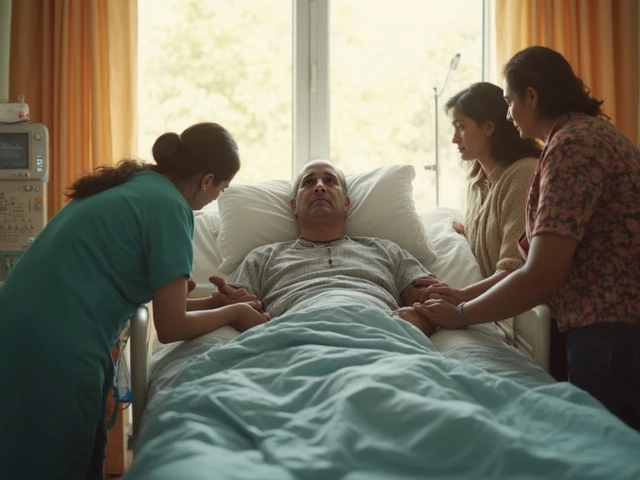How does life change after heart surgery? Dive into recovery tips, emotional aspects, practical lifestyle changes, and what to actually expect in daily life post-surgery.
Read MoreLife After Heart Surgery: What You Need to Know Right Now
Coming out of the operating room can feel like stepping into a whole new world. You might be wondering how long you’ll stay in the hospital, what the pain will be like, and how soon you can get back to daily life. Below is a straightforward guide that cuts through the jargon and gives you the most useful info for the weeks and months ahead.
How Long Is the Hospital Stay?
The average stay after most heart surgeries, such as bypass or valve repair, is around 5‑7 days. This can vary based on your age, the type of procedure, and any complications that pop up. Average Hospital Stay After Heart Surgery outlines the key factors that can shorten or lengthen that timeline, like pre‑existing conditions or how quickly your heart starts beating normally again.
Managing Pain and Discomfort
Post‑op pain is real, but it doesn’t have to dominate your recovery. Doctors usually prescribe a mix of short‑acting opioids and non‑opioid meds to keep you comfortable while you start moving. Keep a pain diary – note the time, intensity, and what you took. That helps your care team adjust doses and avoid unnecessary side effects. If pain spikes after a walk or a cough, it’s a sign to pause and talk to your nurse.
Beyond medication, gentle breathing exercises and walking a few steps in the hallway each day can lower pain scores. The simple act of standing up releases endorphins and improves circulation, which speeds up healing.
Nutrition: Fuel for a Healing Heart
What you eat in the first few weeks can make a huge difference. Focus on lean proteins, whole grains, and plenty of vegetables. Foods rich in omega‑3 fatty acids – like fish, walnuts, and flaxseed – help reduce inflammation. Stay away from heavy, fried, or salty meals that can strain your heart and raise blood pressure.
Hydration is just as important. Aim for 8‑10 glasses of water a day unless your doctor tells you otherwise. If you’re on blood thinners, keep a consistent intake of vitamin K foods (spinach, kale) and discuss any big changes with your doctor.
Gentle Activity and Getting Back to Normal
Within 24‑48 hours, most surgeons encourage you to sit up, swing your legs, and take short walks. By the end of the first week, you should be able to walk around the ward without feeling dizzy. The key is to increase activity in small steps – add a few extra minutes each day rather than trying a marathon.
After you’re home, a cardiac rehab program can guide you through safe exercises and track your progress. These programs teach you how to monitor your pulse, recognize warning signs, and build stamina without over‑loading the heart.
Emotional Well‑Being and Support
It’s normal to feel anxious or down after a major surgery. The emotional roller‑coaster is part of the healing process. Talk openly with family, join a heart‑surgery support group, or consider seeing a therapist who knows about cardiac recovery. The article Heart Surgery Recovery: What Makes It So Tough? explains why mental stress can slow physical healing and offers practical ways to stay positive.
Keep a daily journal of how you feel – both physically and emotionally. Seeing small improvements recorded over time can boost morale and keep you motivated.
Follow‑Up Appointments and Red Flags
Your surgeon will schedule a follow‑up within 2‑4 weeks to check the incision, review medications, and run any needed tests. Pay close attention to signs like increased redness, swelling, fever, new shortness of breath, or chest pain that doesn’t go away after a few minutes. If any of these appear, call your doctor immediately.
Make a checklist for each visit: blood pressure reading, weight, medication list, and any new symptoms. Having everything written down helps the doctor spot trends and adjust treatment quickly.
Recovering from heart surgery is a marathon, not a sprint. By staying informed, moving gently, eating right, and watching your emotional health, you give your heart the best chance to bounce back strong. Use this guide as your roadmap, and remember that each small step adds up to a healthier, pain‑free life after surgery.





